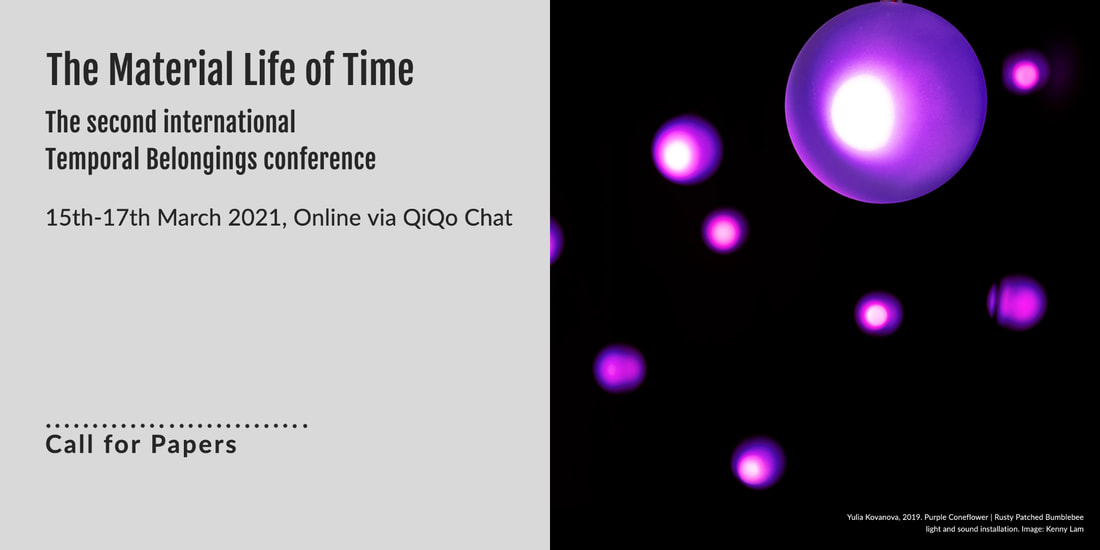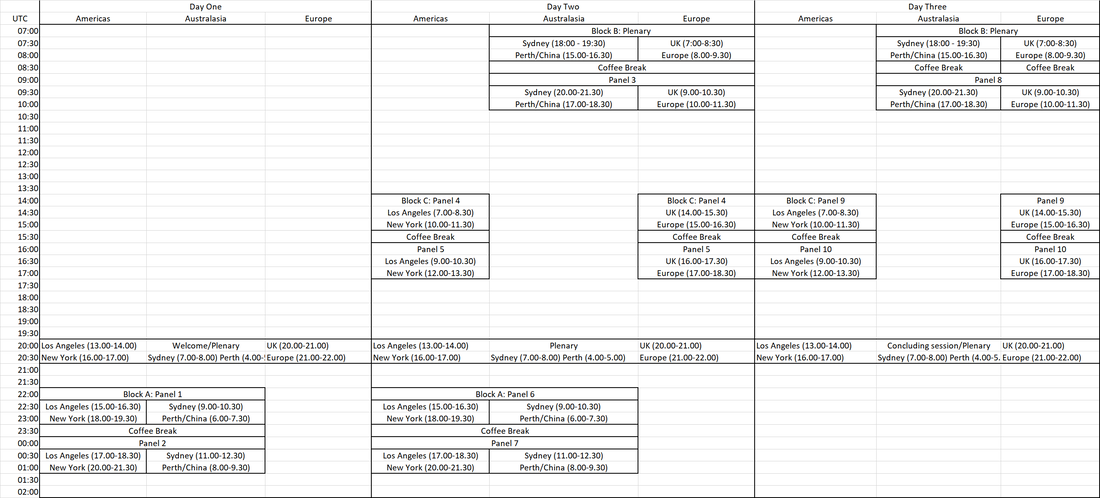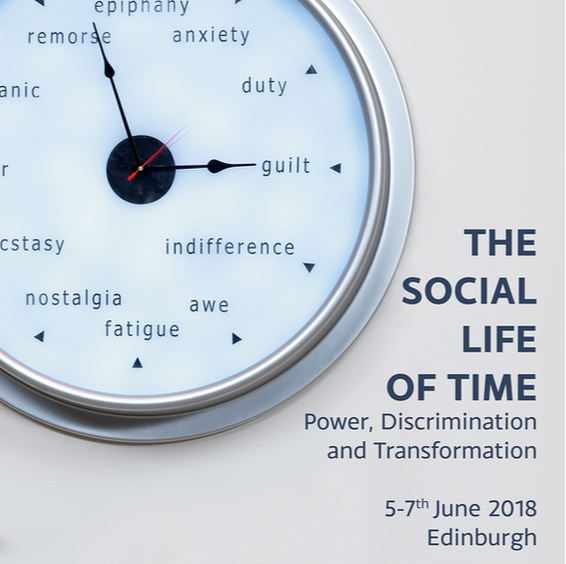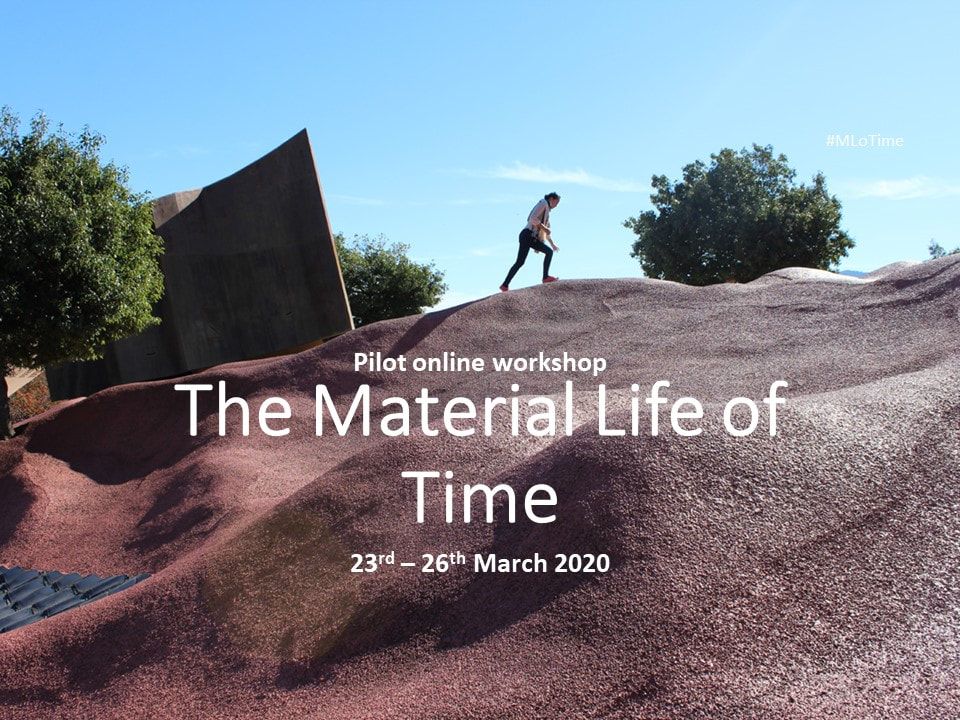|
Call for Contributions to a Special Issue of Early Popular Visual Culture (Taylor & Francis):
“Representing and Seeing Time Before 1930” Just as it is clear that temporalities are historically contingent and socially and culturally constructed, it is also clear that time has taken different guises in the past and particularly in popular visual culture. Although scholars differ in dating the origins of popular visual culture, much of its development coincided with epochal transformations in timekeeping and time awareness itself. From roughly the eighteenth century onward, the form and content of widely circulated, often mechanically reproduced, images and objects reflected a growing global preoccupation with clock time, deep geological time, historical time, and other temporal modes. While scholars of early popular visual culture have examined the ways in which specific media have embodied and represented new ideas and practices of time, the same question is asked more rarely of popular visual culture before 1930. To what extent were the temporal manipulations of photography and cinema enmeshed or reflect in less quintessentially “modern” media such as engravings and theatre? What was the effect on visual culture of the increasing ubiquity, mechanization, and standardization of time prior to high modernism in the arts and the discovery of relativity in the sciences? Did it register as presence or absence, or a mixture of the two in popular visual culture? How was time re-imagined, produced, and consumed in museums, popular magazines, vaudeville theatres, advertisements, and other popular media? What was the effect on coalescing temporal modalities of increasingly ubiquitous forms of popular visual culture? The peer-reviewed journal Early Popular Visual Culture seeks original research contributions on these and related questions for an interdisciplinary special issue, “Representing and Seeing Time Before 1930,” to be edited by Justin T. Clark (Assistant Professor of History, Nanyang Technological University) and Alexis McCrossen (Professor of History, Southern Methodist University). Potential topics include, but are by no means limited to: time-notation in print and material culture (e.g. illustrated calendars, almanacs, and holiday cards); representations and exhibitions of natural history and antiquity; mechanical timekeeping and its artifacts; images of urban and environmental transformation; visual memorials and commemorations; representations of death and dying; instantaneity and non-instantaneity in photography and other media; serial or non-linear visual narratives (theater, film, comics, etc.); techniques of temporal representation across media; speculative visualizations of time travel and the future; and depictions of aging and the life cycle. Prospective contributors should submit abstracts of 250-500 words to https://bit.ly/2SIqSXa before January 15, 2021. Illustrations are encouraged. Drafts of 5,000-10,000 words will be due in August 2021, and publication is tentatively scheduled for August 2022. Justin Tyler Clark, Assistant Professor of History, Nanyang Technological University Alexis McCrossen, Professor of History, Southern Methodist University WAIT - Waiting for an uncertain future: the temporalities of irregular migration
The WAIT project has focused on the temporal aspects of migration and investigated how temporal structures related to irregular migration are shaped by legal regimes, cultural norms and power relationships, and how they shape subjective experiences and life projects. The project adds a temporal perspective to dominant spatial approaches in migration studies, and advances theories of temporality in the humanities and social sciences. Waiting has been scrutinized ethnographically in four European migration-hubs: Oslo, Stockholm, Marseille, and Hamburg, and analytically through targeted theoretical tasks. Waiting as an analytical perspective offers new insights into the complex and shifting nature of processes of bordering, belonging, state power, exclusion and inclusion, and social relations in irregular migration. The conference will be held on the platform Zoom, and it's now possible to register your participation. At the closing conference, core researchers and network partners present their research. Speakers include: Bridget Anderson, Nicholas De Genova, Kari Anne Klovholt Drangsland, Thomas Hylland Eriksen, Randi Gressgård, Christine Jacobsen, Helge Jordheim, Marry-Anne Karlsen, Shahram Khosravi, Odin Lysaker, Sandrine Musso, Gregor Noll, Jessica Schultz, Jo Vearey, Sarah Willen, Katerina Rozakou, Johannes Machinya and Frode Eick. CLICK HERE TO READ THE PROGRAMME AND REGISTER FOR THE CONFERENCE Mobility, Time & Political Possibility
Deconstructed diasporic workshop Convened by: Noora Lori Boston University Anne McNevin New School for Social Research Loren B Landau University of Oxford & Witwatersrand Mobility, Time and Political Possibilities is a year-long virtual writing workshop running from early 2021 and culminating in an in-person even in early 2022. We envisage a small, but committed group of scholars meeting monthly, in camera, to share and critically engage each other’s work-in-progress, on a rotating basis. Our aim is to produce a provocative interdisciplinary edited volume or special issue, via a collaborative and iterative process. The regulation of human mobility via the use of time has attracted much recent scholarly attention. Much of this work is concerned with waiting, stoppage, deferral and delay as disciplinary techniques or by-product. Rarely is time and its manipulation framed as a form of elusion or liberation. Less often still, is the time at stake in these techniques, itself submitted to critical inquiry. Does waiting, for example, imply an interruption, and sometimes a form of injustice, only because of assumptions about the progressive direction in which time is expected to flow? Distinguishing specific measures of time from the notion of temporalities – that is, ways of knowing and ordering time - opens up a larger set of questions about space-time parameters according to which mobilities are governed, and futures are imagined and desired. How might processual, quantum, Indigenous or other ways of conceptualizing time be brought to bear on thinking about mobility and its horizons? Our intention is not to produce an almanac of the miserable: a series of studies into forms of waiting or frustrated futures manifested across the globe. Rather, it is to consider how temporal forms of exclusion, alienation, marginalisation and manipulation underlie governance –broadly conceived – and open possibilities for transforming political futures. On one hand, we are interested in the imbrication of time and temporality with mechanisms for racialisation, spatialization, expropriation, displacement and extraction. This includes attending to how states deploy time (and its miscounting) to police national boundaries by developing legal manoeuvres that separate the chronological advancement of the clock from the counting of time under the mantle of the law. By pegging rights to specific legal statuses, and counting the time of different statuses differently, states can suspend, slow down, or speed up chronological time in order to exclude, delay, or (conversely) hasten the inclusion of particular non-citizen residents The politically strategic use of time is not only about control of mobility per se, but also about naming, categorizing, and emplacing in temporal terms (as advanced or backwards, primitive, or modern for example). On the other hand, we want to consider how time and temporality intersect with resistance, critique and the cultivation of alternative political formations, including modes of hospitality and welcome, political community, and justice. How do plural temporalities provide new reference points from which to examine the forms of power at stake in questions of mobility and from which to signal other kinds of mobile aspirations beyond integration into progressive/developmental futures. If time is a discipline, what forms of ill-discipline do multi-temporalities create? How might they operate as forms of intentional or de facto resistance, deploying, what Lefebvre calls polyrhythmicity that makes governing more difficult? Or that generates what Deleuze and Guattari label ‘nomadic power’? How do varied spatio-temporal conceptions of the political present open or curtail the possibility of collective mobilization? What subjects emerge at these points of intersection and disjuncture? What kinds of maps might be drawn to capture the intersection of space, time and mobility imagined and experienced in other ways? What visual and aesthetic vocabularies might be deployed for the same purpose? What histories might inform this openness to temporalities in play? What methodologies are needed to investigate them? Where, when and how do we focus our inquiries? The goal is a collection that is both conceptually and methodologically provocative: outlining new themes, approaches, and considerations for the socio-spatial and political study of human mobility. Those interested in participating are requested to submit a 500-750 word abstract by 19 October 2020. A committee will assess the abstracts and provide potential participants additional details in early November 2020. As an interdisciplinary workshop, we welcome participants from across the social sciences working from all methodological and theoretical perspectives. We particularly encourage submissions from emerging scholars and people working in and on sites outside Europe and North America. All abstracts and queries should be sent to temporality@migration.org.za Call for Papers
International Society for the Study of Time (ISST) Eighteenth Triennial Conference June 26-July 1, 2022 / Yamaguchi, Japan Time and Measure Proposals (300 words) due by August 15, 2021 The ISST, renowned for its interdisciplinary scope, invites scientists, scholars, artists and practitioners to explore questions concerning Time and Measure at its 18th Triennial Conference to be held in collaboration with the Research Institute of Time Studies (RITS) at Yamaguchi University in South-Western Japan. Our format of plenary presentations delivered over four days creates a sustained discussion among participants. We thus expect participants to register for the entirety of the conference. We shall take a day off mid-conference and provide participants a choice of time-related excursions in the Yamaguchi area, the site of crucial events at various turning points in Japanese history . Because of worldwide uncertainty brought about by the pandemic, we shall be considering whether and how we may allow for online conference participation. Further information will follow. For its 2022 Triennial, the ISST wishes to instigate discussion of all the kinds of temporal measure—both quantitative and qualitative—which are the work of our different professional disciplines and some of which may also prove to be cross-disciplinary. When asked about time and its measure, most people would think of clocks: an even progression of numbers. This view goes back to Aristotle’s definition of time (in Physics IV) as “the count [arithmos] of changing in respect of before and after.” As recent events have made us aware, however, times of crisis may require other measures. Political crises or a crisis like the pandemic seem to impose their own measure of time. Crisis thus throws into relief the fact that not all times are equal—something that musicians, strategists and physicians have always known; these professionals and others have had to develop their own systems of taking time’s measure–some dependent on clocks, some not. Suggested Topics
--time, measure, money and generosity --history as the measure or mismeasure of time --the measurement of public vs individual time --tense/aspect, mood, person and voice in languages --measurement as determining our understanding of the measured --the limits of measuring time --cosmic clocks Guidelines/Timeline for Proposals Proposals will be for 20-minute presentations in diverse formats: scholarly paper, debate, performance, overview of creative work, installation, workshop. Proposals for interdisciplinary panels are especially welcome. (Each paper for a panel must be approved by the selection committee.) All work will be presented in English and should strike a balance between expertise in an area of specialization and accessibility to a general intellectual audience. Proposals, no more than 300 words in length, are submitted electronically. The author’s or authors’ name(s) should not appear in the proposal as the ISST does blind reviewing in selecting papers for its conferences. The deadline for submission is August 15, 2021, with acceptances communicated by December 15, 2021. The Society also seeks session chairs, whose names will be included on the printed conference program. http://www.studyoftime.org/News.aspx?ID=35 We are pleased to announce a call for papers for our next Temporal Belongings conference - The Material Life of Time, which will be taking place on the 15th-17th March 2021. You can find full details of the call, including information on how to submit here.
As part of sharing our thinking and development work as we plan our next conference, Michelle Bastian has written up our thoughts about timetabling a synchronous online conference, and how we came up with the proposed schedule shown below.
Indeterminate Futures / The Future of Indeterminacy
Transdisciplinary Conference 13 – 15 November 2020, University of Dundee Keynotes: Karen Barad, Franco Berardi, Xin Wei Sha, Vladimir Tasić The future is no longer seen as open. It’s seen as precarious on the one hand, and technologically over-determined on the other. Economic uncertainty, the rise of the risk society, the culture of fear and neoliberal necropolitics are seen as a serious threat. The risk society attributes all hazards to human decisions; the culture of fear cultivates the tendency to catastrophise; neoliberal necropolitics welds technology to the exploitation of natural and social reserves in an irreversible way. Amidst the general climate of ‘instrumentarianism’ (Zuboff 2019), paradoxes like ‘the cancelled future’ (Berardi 2014) or ‘automated deregulation’ (Steyerl 2019) are synonymous with permanent crisis, disorder, and the 'end of free will' (Han 2017). Indeterminacy – often associated with but not identical to unknowability and liminality – doesn’t merely defy the ‘order-disorder’, ‘certainty-uncertainty’ binary creating a ‘both-and’ and ‘neither-nor’ space in which a cat can be both dead and alive, as in Schrödinger’s experiment. Indeterminacy is a self-perpetuating dynamic of change with no spatial or temporal constancy – a vibrant multiplicity of parallel potentialities and realities. Initially derived from Bohr’s quantum indeterminacy, Gödel's undecidability, and Stengers and Prirogine's non-linear dynamics, indeterminacy upsets stable structures and ossified power regimes which is why it was embraced as a liberating epistemic force by many 20th century artists and theorists: Jarry, Boulez, Cage, Ichinayagi, Situationists International, Xenakis, Fluxus, Knowbotic Research, Derrida, Guattari, Hayles, Varela and Latour, to mention but a few. In the digital age, in accelerated, informational capitalism, the situation is very different. First, permanent change is the rule. Second, art, culture, and (bio)politics are no longer separate; they are fused in the infosphere. Consisting of datification, algorithmic predetermination, cultural production, symbolic and affective regimes, the infosphere has modified the language of thought and action. It has also modified the structure of reality. The aim of this transdisciplinary conference is to evaluate the current and future epistemic and ontological potential of spatio-temporal, cultural-mnemonic and socio-political forms of indeterminacy. To this end, we ask questions such as:
We invite proposals for 20 min papers, provocations, creative contributions, re-enactments of scientific experiments and proposals for curated panels from the fields of art, media (theory), physics, mathematics, philosophy, cultural studies, memory studies, digital humanities, and anthropology. Possible topics include but are not limited to:
Panel proposal deadline: 20 April 2020 (1000 w proposal + 450 speaker bios) Individual presentation deadline: 1 May 2020 (350 w abstract + 150 bio) NEW DUE DATE 15th JUNE. Notification of Acceptance: 10 May 2020 Please email abstracts with ‘Indeterminacy Conference’ in the subject to indeterminacy@dundee.ac.uk This conference is hosted by the AHRC-funded project The Future of Indeterminacy: Datification, Memory, Biopolitics. We are pleased to annouce that papers arising from our 2018 Temporal Belongings conference The Social Life of Time are now out in Time & Society. See a wonderful selection of papers including Charles W. Mills keynote "The chronopolitics of racial time".
TABLE OF CONTENTS Introduction: The social life of time Michelle Bastian , Lisa Baraitser , Michael J Flexer , Andrew R Hom and Laura Salisbury The chronopolitics of racial time Charles W Mills Waiting as a redemptive state: The ‘Lampedusa in Hamburg’ and the offer from the Hamburg government Kari Anne K Drangsland Jaffa’s times: Temporalities of dispossession and the advent of natives’ reclaimed time Yara Sa’di-Ibraheem The Trump administration’s politics of time: The temporal dynamics that enable Trump’s interests to determine American foreign policy Christopher McIntosh Times of power, knowledge and critique in the work of Foucault Jürgen Portschy Seizure aesthetics: Temporal regimes and medical technology in epilepsy diagnosis Megh Marathe The ‘telegraphic schizophrenic manner’: Psychosis and a (non)sense of time Michael J Flexer The secret of quick thinking: The invention of mental speed in America, 1890–1925 Justin Tyler Clark No time to waste – How the social practices of temporal organisation change in the transition from work to retirement Anna Wanka From Combahee resistance to the Confederate : Black feminist temporalities and white supremacy Tanya Ann Kennedy Thinking about the meaning of time among temporary labor migrants in Israel Robin A Harper and Hani Zubida Ruins of pre-gentrification: Schrotthäuser and urban standstill in a postindustrial city Felix Ringel Time as a source of struggle and resilience in homeless families Peter Fraenkel The social life of time and methods: Studying London’s temporal architectures Ella Harris and Rebecca Coleman In March we held a three day pilot workshop to start testing out some approaches for our next conference. You can see the agenda here and I've also written up some longer reflections over on my personal blog.
In the context of the global pandemic, we invite contributions of time-related writings and projects emerging out of your current experience now. Locked in a heightened sense of the present moment, how has our attention to and expectation of time changed? With increased uncertainty towards the future, how are temporal perspectives shifting and what new concepts are taking shape?
The Anthropocene – the critical era marking human impacts on the environment – designates a duration with fuzzy boundaries. As a geologic era, it remains unofficial and without an origin or ‘Golden Spike’; as a historical period, its span, causes, and definitive questions remain open to conjecture. As a juncture characterized by the entanglement of disparate timescales (biological, ecological, geologic, cosmic), the Anthropocene is less a distinct “time” than a plurality of temporalities. With urgency, we invite scholars and artists to reflect on Anthropocenic temporalities in a variety of modalities, welcoming projects and writing in any creative style or critical genre. We seek to assemble a rich range of contributions from emerging and established writers, who share concern and commitment to the Anthropocenic situation. Contributions are invited for a special issue of Kronoscope: Journal for the Study of Time (Brill) entitled “Anthropocenic Temporalities.” As an interdisciplinary journal directed by The International Society for the Study of Time, Kronoscope welcomes work from all fields. Proposals (abstracts of 250-500 words) or completed work may be sent to the co-editors: Paul Harris (paul.harris@lmu.edu) and Emily DiCarlo (emily.dicarlo@mail.utoronto.ca). Submissions due: June 1, 2020 (11:59 p.m. PST) Paul Harris, Professor of English at Loyola Marymount University and co-editor of SubStance, was President of the International Society for the Study of Time 2004-2013. An interdisciplinary scholar and artist, his current work revolves around stone in contexts including installations, garden design, viewing stone display, geopoetry, and ecosophy. Emily DiCarlo is an artist and writer whose interdisciplinary work applies methodologies that often produce collaborative, site-specific projects. Evidenced through video, performance and installation, her research connects the infrastructure of time with the intimacy of duration. She is currently pursuing her Master of Visual Studies at the University of Toronto and is the 2019-2020 recipient of the Canadian Social Sciences and Humanities Research Council Scholarship. |
Announcements
New article published reflecting on our online conference, and how we designed for conviviality.
What's this?
Our curated listing of events and news related to time, temporality and social life. Archives
January 2023
Categories
All
|
- Home
- About
- Resources
-
Events
- Timely methods for novel times
- The Material Life of Time
- The Material Life of Time Pilot
- The Social Life of Time >
- Temporal Design >
- Immortality and Infinitude >
- Power, Time and Agency >
- Methods Festival >
- Time in the Archives
- Hope and Community Futures
- Temporal Conflicts >
- Community Connectivities >
- Contact




 RSS Feed
RSS Feed
